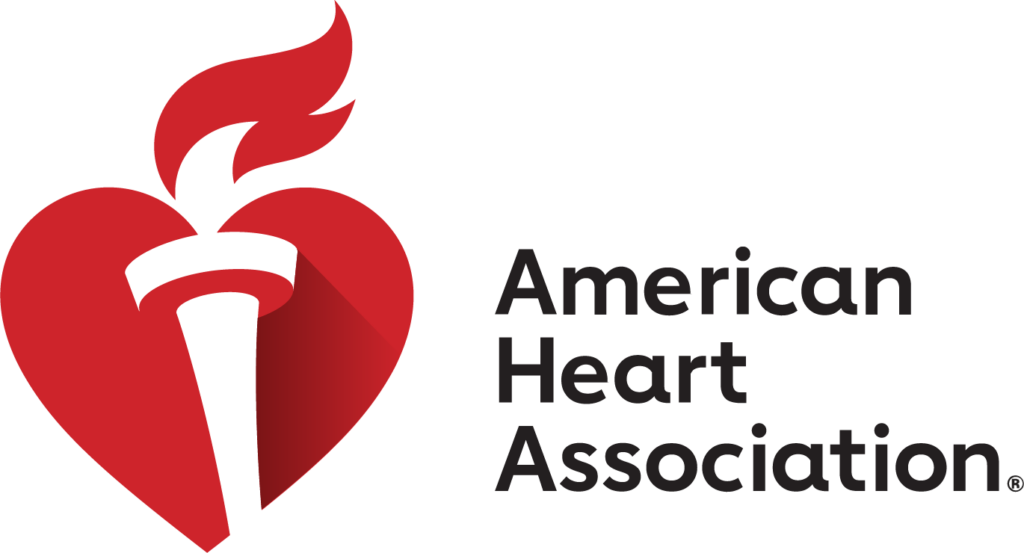


Equity and High Blood Pressure (HBP)
High blood pressure (also referred to as HBP or hypertension) is when your blood pressure, the force of blood flowing through your blood vessels, is consistently too high. Nearly half of American adults have high blood pressure. Many don’t even know they have it. The best way to know if you have high blood pressure it is to have your blood pressure checked. Learn how a blood pressure test works.
The prevalence of high blood pressure among Black people in the United States is among the highest in the world: about 55% of Black adults have hypertension.
Historical and systemic factors play a major role in these statistics. Among them are adverse social determinants of health; in other words, the conditions in which a person is born and lives. The determinants include lack of access to care, lack of access to healthy foods and other societal issues.
Our Mission is to be a relentless force for a world of longer, healthier lives, free from heart disease and stroke. For nearly 100 years, the American Heart Association has been fighting heart disease and stroke and helping families and communities thrive. Since 1949, more than five billion dollars has been invested in research funding, more than any U.S. organization except the federal government. We’ve seen a 13.6 percent reduction in deaths from stroke and a 15.1 percent reduction in deaths from heart disease since 2018. We aim to meet people where they live, work, pray and play to improve health outcomes, such as disproportionate rates of hypertension.
The Importance of CPR
Did you know that if you are called to give CPR in an emergency, you will most likely be trying to save the life of someone you love? It could be a child, a spouse, a parent or a friend. Are you ready to save their life? You can learn hands-only CPR in just 60 seconds. Learn more and join our Nation of Lifesavers.
HBP Resources
If you have recently been diagnosed with high blood pressure or if you have a loved one with this condition, please review these resources from the American Heart Association. They will help you better understand and manage your condition as well as get support.
Understanding HBP
Understanding blood pressure is the first step for anyone dealing with this condition. These links are an easy way to learn more.
- What is High Blood Pressure? (website)
 Let’s define high blood pressure. High blood pressure (HBP or hypertension) is when your blood pressure — the force of your blood pushing against the walls of your blood vessels — is consistently too high. How do your blood pressure and circulatory system work? Learn more.
Let’s define high blood pressure. High blood pressure (HBP or hypertension) is when your blood pressure — the force of your blood pushing against the walls of your blood vessels — is consistently too high. How do your blood pressure and circulatory system work? Learn more. - Understanding Blood Pressure Readings (website)
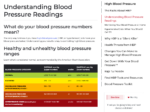 What do your blood pressure numbers mean? The only way to know if you have high blood pressure (HBP or hypertension) is to have your blood pressure tested. Understanding your results is key to controlling high blood pressure. Learn what’s considered normal, as recommended by the American Heart Association.
What do your blood pressure numbers mean? The only way to know if you have high blood pressure (HBP or hypertension) is to have your blood pressure tested. Understanding your results is key to controlling high blood pressure. Learn what’s considered normal, as recommended by the American Heart Association. - Health Threats from High Blood Pressure (website)
 High blood pressure threatens your health and quality of life. In most cases, damage done from high blood pressure (HBP or hypertension) occurs over time. Left undetected or uncontrolled, high blood pressure can lead to many serious conditions. Learn more.
High blood pressure threatens your health and quality of life. In most cases, damage done from high blood pressure (HBP or hypertension) occurs over time. Left undetected or uncontrolled, high blood pressure can lead to many serious conditions. Learn more. - Let’s Talk About Blood Pressure (eLearning course)
 This short, interactive course will explain why HBP is called a “Silent Killer,” help you determine if you may be at risk for HBP, address how to lower your blood pressure and more.
This short, interactive course will explain why HBP is called a “Silent Killer,” help you determine if you may be at risk for HBP, address how to lower your blood pressure and more.
Measure, Manage and Change HBP
The only way to know if you or a loved one has high blood pressure (HBP or hypertension) is to have blood pressure tested.
- Monitoring Your Blood Pressure at Home (website)
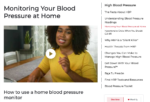 There are several tips for getting accurate readings when taking your own or a loved one’s blood pressure. This site will walk you through what you need to know.
There are several tips for getting accurate readings when taking your own or a loved one’s blood pressure. This site will walk you through what you need to know. - How to Measure Your Blood Pressure at Home (pdf)
 Download and print a PDF guide that covers all the important steps to home blood pressure monitoring.
Download and print a PDF guide that covers all the important steps to home blood pressure monitoring. - Blood Pressure Toolkit (resource library)
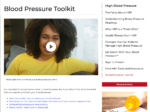 Our blood pressure toolkit contains many resources to help you measure, manage and control your blood pressure effectively. Watch videos, download discussion guides and access other PDF files that identify risk factors that can raise your blood pressure and medicines that can treat HBP.
Our blood pressure toolkit contains many resources to help you measure, manage and control your blood pressure effectively. Watch videos, download discussion guides and access other PDF files that identify risk factors that can raise your blood pressure and medicines that can treat HBP.
Working with Your Doctor
Talking with your health care professional is the first step to improving your blood pressure.
- Find a Health Center Near You (online tool)
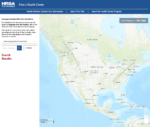 If you don’t already have a provider, this national database can help you find a provider near you. Just enter your address, and then you can view and download results.
If you don’t already have a provider, this national database can help you find a provider near you. Just enter your address, and then you can view and download results. - 6 Questions to Start the Conversation (interactive and pdf guides)
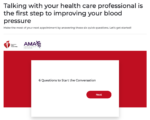 Make the most of your next appointment by preparing your answers to these six questions. Write down your answers in advance, and make a note of any other questions you have for your doctor. Let’s get started.
Make the most of your next appointment by preparing your answers to these six questions. Write down your answers in advance, and make a note of any other questions you have for your doctor. Let’s get started. - Guide for Making Doctor Appointments (website)
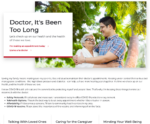 It’s important for us and our families to get regular health checks. Loving our family means making sure that we, our parents, tíos and abuelos maintain doctor’s appointments. Keeping under control any serious but manageable conditions — like high blood pressure — can help us enjoy more healthy years with loved ones.
It’s important for us and our families to get regular health checks. Loving our family means making sure that we, our parents, tíos and abuelos maintain doctor’s appointments. Keeping under control any serious but manageable conditions — like high blood pressure — can help us enjoy more healthy years with loved ones.
Support for Patients and Caregivers
Managing High Blood Pressure becomes more achievable when you have the right kind of emotional support. We have an online community of patients, survivors and caregivers who know what you’re going through and can help you find your footing on the path to better health. Connect with others, start conversations, and share your experience.
- Access our Support Network (website)
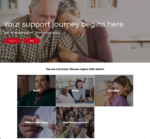 You are not alone. Whether you have hypertension or are caring for a family member, friend or spouse who does, your support journey starts here. Research shows that support after a heart event can improve your ability to make changes to live a longer, healthier life. Our community is here to help you deal with uncertainty or questions you’re confronted with, and others may be encouraged by your personal journey as a survivor or caregiver.
You are not alone. Whether you have hypertension or are caring for a family member, friend or spouse who does, your support journey starts here. Research shows that support after a heart event can improve your ability to make changes to live a longer, healthier life. Our community is here to help you deal with uncertainty or questions you’re confronted with, and others may be encouraged by your personal journey as a survivor or caregiver.
Stress Management and Mental Health
Part of managing blood pressure is managing stress and your mental health. It’s not only about your own personal well-being. It’s about protecting the futures of everyone you love and care for.
- Mental Health and Well-Being (website)
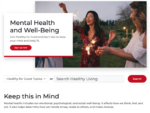 Mental health includes our emotional, psychological and social well-being. It affects how we think, feel and act. It also helps determine how we handle stress, relate to others and make choices. Join Healthy for Good and learn tips to keep your mental-health and wellbeing as a top priority.
Mental health includes our emotional, psychological and social well-being. It affects how we think, feel and act. It also helps determine how we handle stress, relate to others and make choices. Join Healthy for Good and learn tips to keep your mental-health and wellbeing as a top priority.
Other Resources
- AHA High Blood Pressure (website)
We have many other tools, tips and resources for people living with hypertension, caring for those with hypertension and people trying to prevent hypertension.

Everyone deserves an optimal and just opportunity to be healthy, giving special attention to the needs of those at greatest risk of poor health. No one should be disadvantaged from achieving their potential because of social position or any other socially defined circumstance.
Eduardo Sanchez
M.D., M.P.H., FAHA, FAAFP, the American Heart Association’s chief medical officer for prevention